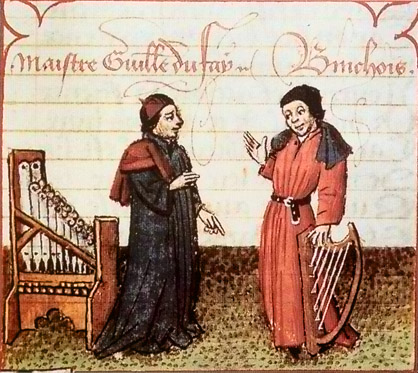Dufay, Supremum est mortabilus
 Guillaume Dufay (c. 1397-1474) was a significant figure among the composers of the Burgundian School, which included Binchois, Busnois, and Dunstaple. We have not featured any of these composers yet in this series, although we included Dufay’s music in our Early Sacred Music course.
Guillaume Dufay (c. 1397-1474) was a significant figure among the composers of the Burgundian School, which included Binchois, Busnois, and Dunstaple. We have not featured any of these composers yet in this series, although we included Dufay’s music in our Early Sacred Music course.
Dufay also played a role in the transition of music from the medieval to the Renaissance. In Supremum est mortabilus, he is still using isorhythm—a prominent feature of late medieval music. But this is also the earliest work that calls specifically for fauxbourdon. In music history, Dufay’s name is forever associated with fauxbourdon. Fauxbourdon (false bass) entailed voices moving parallel to one another at the interval of a sixth. The fourth below the top voice completed what our modern ears recognize as a diatonic triad in first inversion. If that’s too much theory for you, just know that you are hearing harmonies that sound like they belong to our tonal system. It’s not tonality yet, but it’s a mix of sonorities that partly sound medieval and partly modern. That mixture, to me at least, gives Dufay’s music a particularly interesting sound.
The work has an unusual feature when the contrapuntal texture changes suddenly at the end (5:54) at the naming of Pope Eugene IV and the Holy Roman Emperor Sigismund. Dufay pent part of his professional life in Italy in the service of the pope, becoming a member of the Papal choir and also an ordained priest, and his prominence as a composer was then well established. That also placed him in the midst of ongoing political struggles concerning the papacy. He later obtained a law degree before returning to his native Cambrai in northern France as canon at the Cathedral.
| Supremum est mortalibus bonum Pax, optimum summi Dei donum. Pace vero legum praestantia Viget atque recti constantia; Pace dies solitus et laetus, Nocte sonus trahitur quietus; Pax docuit virginem ornare Auro comam crinisque nodare; Pace rivi psallentes et aves Patent laeti collesque suaves Pace dives pervadit viator, Tutus arva incolit arator. |
The supreme good for mortal men is Peace, the best gift of God on high. The pre-eminence of the law and the constancy of right Grows strong in a true peace; The day follows its usual happy course in peace, Sounds at night are considered peaceful; Peace has taught maids to decorate their hair with gold and knot their tresses; In peace the brooks and birds appear To be making music gladly and in peace The rich traveller passes through the hills pleasantly, The ploughsman safely cultivates his fields. |
| O sancta pax, diu expectata, Mortalibus tam dulcis, tam grata, Sis eterna, firma, sine fraude, Finem tecum semper esse gaude. Et qui nobis, o pax, te dedere Possedeant regnum sine fine: Sit noster hic pontefex eternus Eugenius et rex Sigismundus! |
O holy peace, long awaited, So sweet to men, so welcome, May you be eternal, firm, without deceit; Rejoice that everything ends with you. May they too who gave you, o peace, to us Possess their kingdoms without end; May our Pope, Eugenius, live for ever And king Sigismund! |



